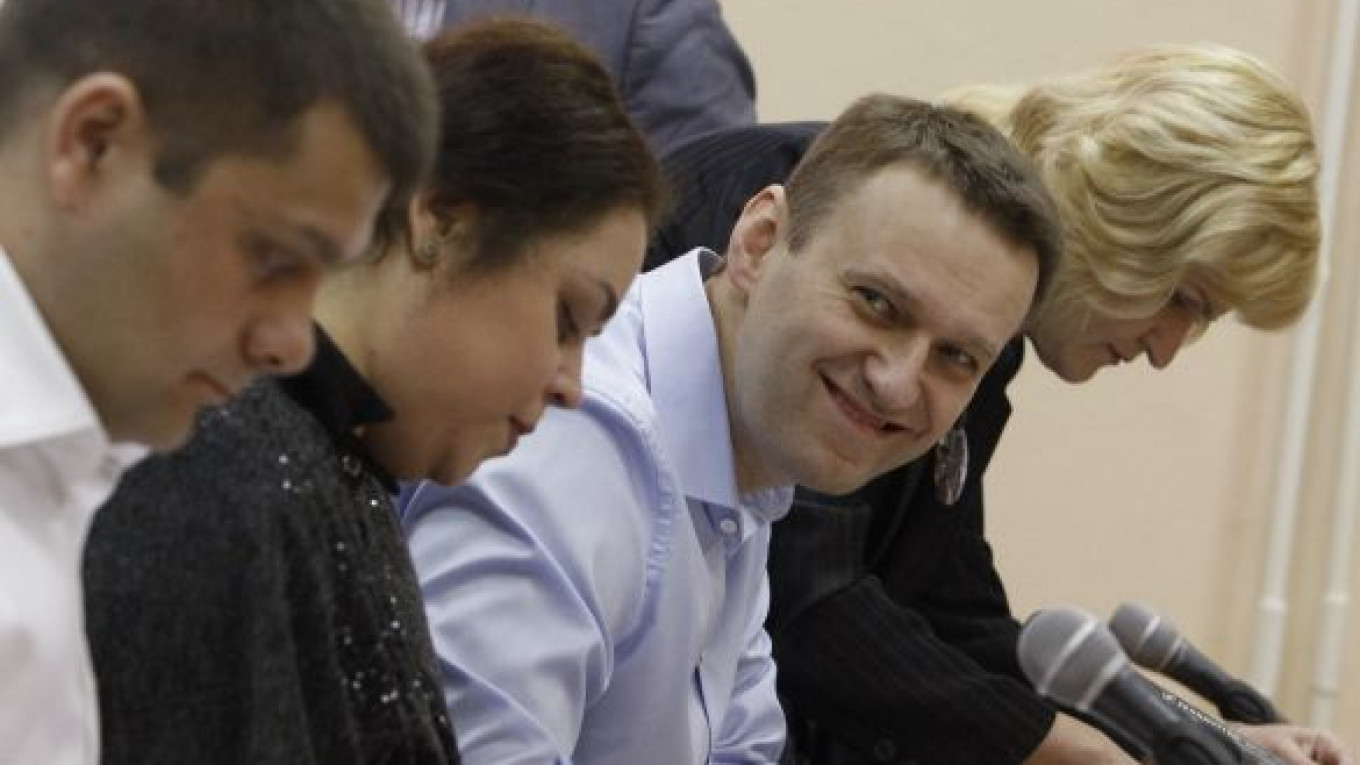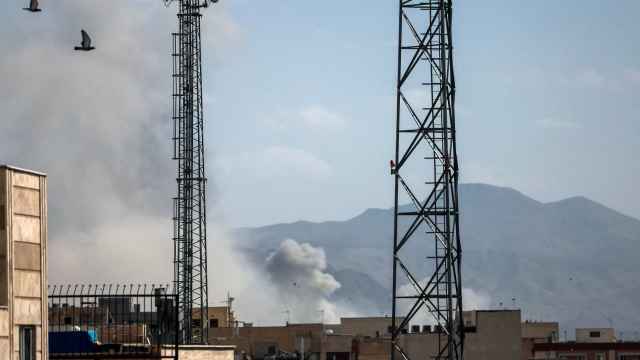Prominent Kremlin critic Alexei Navalny refused to admit guilt on the second day of his embezzlement trial in the provincial city of Kirov on Wednesday, calling the case against him "political revenge" for his strident criticism of the ruling elite.
In a speech directed at the judge, Navalny said he would not "keep quiet and await punishment" for his anti-corruption campaigning, which has often targeted lawmakers from the pro-Kremlin United Russia party.
"This case is an excuse for a huge media campaign painting me as a crook. It also crowds me out of the legal political playing field through legislation banning people convicted of serious crimes from running for elected office," Navalny said to applause from supporters in the courtroom, according to a live broadcast of Wednesday's hearing accessible via the court's website.
Navalny, one of the leading lights in the wayward protest movement against President Vladimir Putin's 13-year rule, is accused of organizing the theft of 10,000 cubic meters of timber from the state-owned KirovLes company while serving as an aide to Kirov region Governor Nikita Belykh several years ago.
The theft allegedly cost the regional budget 16 million rubles (about $500,000), but Navalny has professed his innocence and calls the charges against him fabricated.
He faces up to 10 years in prison if convicted, as does his friend and fellow defendant Pyotr Ofitserov, who is accused of acting as an accomplice in the timber theft and also denies guilt, alleging that the timber was sold legally at a market price.
The pair's trial was meant to start last week but was delayed after Navalny's defense lawyers successfully argued that they were given insufficient time to study the 31-volume case against their client.
Judge Sergei Blinov turned down a request for a further adjournment on Wednesday, as several dozen Navalny supporters held pickets outside the courtroom, holding banners with slogans including "Putin Is a Thief" and "The Case Against Navalny Is a Case Against Us."
During the morning session at Kirov's Leninsky District Court, Vadim Kobzev, one of three lawyers representing Navalny at the trial, asked the court to return the case to prosecutors over a string of alleged procedural violations.
Kobzev said that in the official indictment, prosecutors accused Navalny of causing losses to the state budget of conflicting sums and failed to explain when or how his client organized the supposed timber theft.
Prosecutors also fast-tracked the KirovLes case, rushing to register it with the Kirov court the same day that investigators filed their evidence, Kobzev said.
But after calling a recess of more than three hours, Blinov refused to return the case to prosecutors, calling the defense's arguments "unsound." Blinov, 35, has not acquitted a defendant in the four months since he became a Kirov city judge.
Blinov's refusal provoked a harsh response from Olga Mikhailova, another defense lawyer for Navalny, who called for the judge to be replaced for his "biased" handling of the case and linked the embezzlement charges with Navalny's strident criticism of Alexander Bastrykin, Russia's top investigator.
Mikhailova's request to have Blinov replaced was rejected, and, due to multiple recesses, prosecutors only started outlining their evidence against Navalny before the trial adjourned for the day. The prosecution confirmed, however, that it wanted to call Governor Belykh as a witness.
Navalny, 36, has recently declared presidential ambitions and is the subject of four separate criminal investigations. Navalny loyalists say Kremlin officials are intent on seeing the opposition icon behind bars.
Wednesday's hearing was accompanied by the usual media frenzy that characterizes many of Navalny's public appearances, and U.S. and European Union diplomats made the roughly 900-kilometer trip from Moscow to report back on proceedings.
International rights groups have also spoken up in Navalny's defense. Tatyana Lokshina, New York-based Human Rights Watch's Russia representative, said at a news conference Wednesday that the Navalny trial had a "clear political context."
On a local level, however, interest in Navalny has notably waned since the first KirovLes hearing on April 17, and local political activists said Kirov residents were largely unaware of the high-profile trial taking place in their midst.
"Navalny's trial hasn't made any waves in Kirov," said Alexei Maltsov, leader of the social-democratic Just Russia party's Kirov region branch.
"The vast majority of Kirov's population doesn't know who Navalny is. Television and radio are the dominant sources of information here, and Navalny doesn't feature much on either," he said by phone.
Yaroslav Nemchaninov, a Communist Party activist in Kirov, agreed that few locals had heard of Navalny but said the mood among young Communists was that Navalny was guilty as charged.
"Our position is that both Putin and Navalny are thieves," Nemchaninov said, calling the decision to bring charges against Navalny a tactical error that will allow him to earn "political points" by presenting himself as a victim of state repression.
At the close of proceedings Wednesday, Blinov said Navalny's trial would resume at 9 a.m. Thursday. He said the trial would last until at least May 30 but would be suspended for a two-week break during the May holidays.
The court's schedule means that Navalny will likely be able to attend a planned opposition protest on Moscow's Bolotnaya Ploshchad on May 6 that city authorities sanctioned Wednesday evening.
The protest coincides with the one-year anniversary of violent clashes between police and anti-Kremlin protesters on the same square.
Staff writer Jonathan Earle contributed to this report.
Contact the author at [email protected]
Related articles:
A Message from The Moscow Times:
Dear readers,
We are facing unprecedented challenges. Russia's Prosecutor General's Office has designated The Moscow Times as an "undesirable" organization, criminalizing our work and putting our staff at risk of prosecution. This follows our earlier unjust labeling as a "foreign agent."
These actions are direct attempts to silence independent journalism in Russia. The authorities claim our work "discredits the decisions of the Russian leadership." We see things differently: we strive to provide accurate, unbiased reporting on Russia.
We, the journalists of The Moscow Times, refuse to be silenced. But to continue our work, we need your help.
Your support, no matter how small, makes a world of difference. If you can, please support us monthly starting from just $2. It's quick to set up, and every contribution makes a significant impact.
By supporting The Moscow Times, you're defending open, independent journalism in the face of repression. Thank you for standing with us.
Remind me later.






